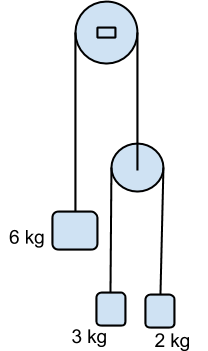A pulley on a pulley
The Image below shows two pulleys, the higher of which is fixed in place. The other pulley is attached to the
mass by a string running over the first pulley. The pulleys turn without friction. With what acceleration, and in what direction, will the
mass begin to move?

Assumptions String and pulleys themselves are all massless
This section requires Javascript.
You are seeing this because something didn't load right. We suggest you, (a) try
refreshing the page, (b) enabling javascript if it is disabled on your browser and,
finally, (c)
loading the
non-javascript version of this page
. We're sorry about the hassle.
I solved this problem by equating the tension in each rope to the force on each block, which is equal to its weight plus its acceleration. I called T1 the tension in the string attached to the 6kg mass, and T2 the tension in the other string. I called a1 the anticlockwise acceleration of the T1 string and a2 the anticlockwise acceleration of the other string. Doing this gave me the following 4 equations:
T 1 = 6 ( g − a 1 ) - Weight minus downwards acceleration for the 6kg block
T 2 = 2 ( g + a 1 + a 2 ) Weight plus upwards acceleration for 2kg block
T 2 = 3 ( g + a 1 − a 2 ) Weight plus acceleration for 3kg block
T 1 = 2 T 2 The two T2 strings must have the same combined tension as T1.
Solving these equations you should find that a1 is g/9 and a2 is 2g/9, so the total acceleration of the 2kg block is 3g/9 = g/3